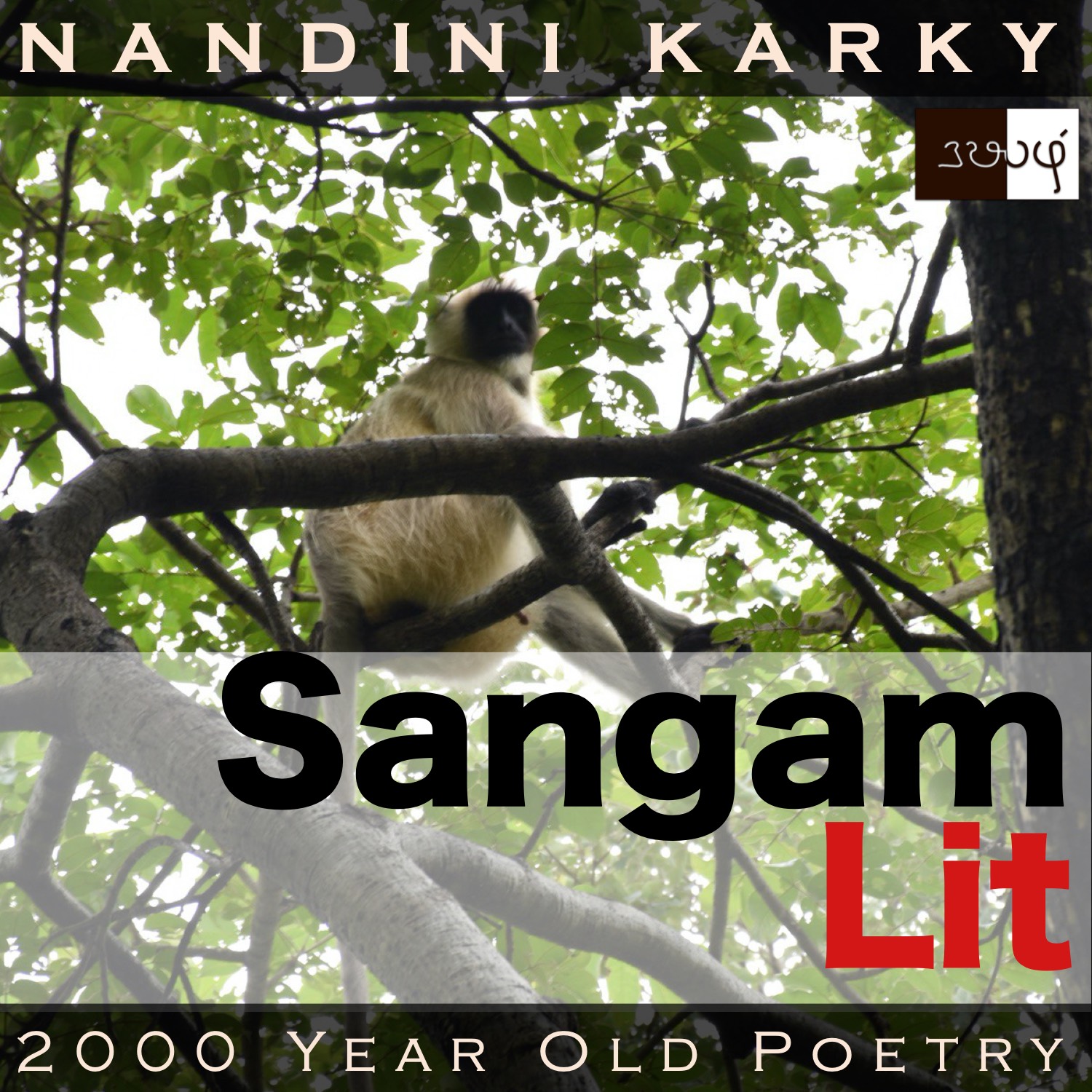Podcast: Play in new window | Download
Subscribe: Apple Podcasts | Spotify | Amazon Music | Android | iHeartRadio | TuneIn | RSS | More

In this episode, we relish a picturesque portrayal of a mountain country, as depicted in Sangam Literary work, Natrinai 326, penned by Madurai Maruthan Ilanaakanaar. The verse is situated in the hills of ‘Kurinji’ and speaks in the voice of the confidante to the man, subtly persuading him to seek the lady’s hand in marriage.
கொழுஞ் சுளைப் பலவின் பயம் கெழு கவாஅன்,
செழுங் கோள் வாங்கிய மாச் சினைக் கொக்கினம்
மீன் குடை நாற்றம் தாங்கல்செல்லாது,
துய்த் தலை மந்தி தும்மும் நாட!
நினக்கும் உரைத்தல் நாணுவல்-இவட்கே
நுண் கொடிப் பீரத்து ஊழ் உறு பூ எனப்
பசலை ஊரும் அன்னோ; பல் நாள்
அரி அமர் வனப்பின் எம் கானம் நண்ண,
வண்டு எனும் உணராவாகி,
மலர் என மரீஇ வரூஉம், இவள் கண்ணே.
Opening with ‘கொழுஞ் சுளைப் பலவின் பயம்’ meaning ‘the luscious clusters of the jackfruit’, the verse delights our senses with the scent and sight of this delicious fruit. Note how the word ‘பயம்’, which in contemporary language means ‘fear’ is used to mean a ‘fruit’ here. The only way I can associate these two meanings of this word is when I think of a ‘Durian’, which is much like a jackfruit but has a strong odour that some love and most hate! I somewhat fear to be in the vicinity of this smelly fruit. Speaking of smells, this verse talks about ‘கொக்கினம் மீன் குடை நாற்றம்’ which means ‘the smell that arises from a bird digging into a fish’s flesh’ and with these few words, the actions of a bird is succinctly captured. We also get to see a ‘துய்த் தலை மந்தி’ or ‘a soft-headed monkey’ in this verse. The phrase ‘நுண் கொடிப் பீரத்து’ talks about ‘the fine creeper of a sponge gourd’. This is the very plant used to make biodegradable loofahs and other dish scrubbing pads, and this is why this plant is sometimes referred to as ‘dishrag gourd’. Moving into the verse, we glimpse at a familiar phenomenon in Sangam depictions – ‘பசலை’ or ‘pallor’. The verse ends with ‘இவள் கண்ணே’ meaning ‘her eyes’, inviting us to look within and perceive the story!
The man and lady had been leading a love relationship and the man had been trysting with the lady for a while. Perceiving that the man was not turning his attention to formalising his union with the lady, the confidante says to him, “In the mountain slopes flourishing with the fleshy fruits of the jackfruit tree, on a huge branch bent with ripe clusters, a bird pierces through a fish’s flesh and unable to bear this smell, a soft-headed monkey sneezes. Such is your mountain country, O lord. I feel shy to say this to you. But, alas! Akin to the withering flower of the slender ‘peeram’ creeper, pallor spreads on her. On many days, knowing of the beauty in our forests, bees arrive thither and not differentiating, think that her eyes are flowers and swarm endlessly around her!” With these words, the confidante is conveying to the man, the dangers in prolonging his clandestine union with the lady.
Now, for the nuances! The confidante starts by talking about a mountain slope, where jackfruit trees abound all around. Wherever the eye travels, these bulky fruits are hanging from bent branches. Just then, a bird flies to one such branch with a fish in its grasp. It then proceeds to peck away at the fish, little by little. As it tears away, the smell of flesh reeks in the air. This seems to waft near the nostrils of a soft-haired monkey and the monkey lets out a loud sneeze. This action-packed scene is expressed by the confidante as if only to describe the man’s mountain country. Then, the confidante talks about how she’s filled with shyness as she wants to express what’s in her mind. Perhaps this is a clue that more meaning hides within that metaphor from the mountains. At the moment, the confidante turns her attention to describing how pallor spreads on the lady, akin to the flower of a ‘peeram’ creeper. She further adds that bees, which arrive to those fertile forests, buzz around the lady, thinking her eyes are flowers!
As the confidante had hinted, there is much more to the metaphor than a mere description of the man’s country. When the confidante talks about the bird feeding on the fish, she refers to the man’s trysting with the lady. The wafting scent of flesh indicates how slander is spreading through the town about the man’s relationship with the lady. The final image of that monkey’s sneeze is to indicate mother’s anger at hearing such news. As it was not considered proper for the confidante or the lady to talk about such things directly to the man, the confidante employs such a layered imagery to convey the urgency in seeking the lady’s hand. We can understand that pallor spreads when the man has gone in search of wealth but why does pallor spread even when he is trysting with the lady and seeing her every day? Apparently, the lady overflows with love for the man that even the momentary separation that happens when he leaves to his village, seems unbearable to the lady. Saying this, the confidante persuades the man that the only way forward is to formalise his union by seeking the blessings of the lady’s parents. The art of weaving a facet of relationships within an intriguing natural scene is illustrated with finesse herein!




Share your thoughts...